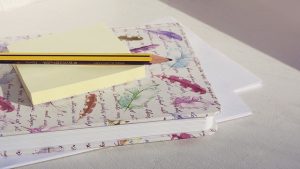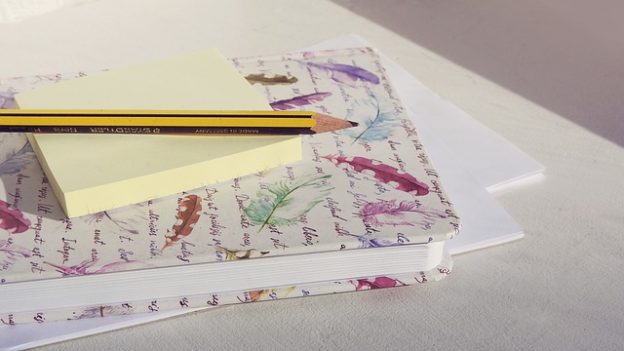Hello fellow searchers of personal development and growth! Have you ever experienced difficulty making meaning of your thoughts and emotions? Do you feel unable to escape negative patterns and limiting beliefs? Keeping a journal could be the key to unlocking your maximum potential if this is the case.
Journaling is an effective method for self-reflection and personal growth. Not only does it assist us in processing our experiences and emotions, but it also enables us to obtain a deeper understanding of ourselves and our lives.
This article will examine why journaling is essential for personal development and how to begin your own journaling voyage. So take a pen and paper (or open a new document on your computer) and let’s get started!
Advantages Of Journaling For Personal Development
 I cannot emphasise the importance of journaling for self-reflection enough.
I cannot emphasise the importance of journaling for self-reflection enough.
Imagine being alone in a room with only a pen and a notebook. You feel relaxed and at ease as you begin to write down your thoughts. Writing can be transformative, allowing you to obtain clarity on your thoughts and emotions.
The use of journaling prompts is a great method to begin exploring your inner world. They provide structure to your writing and help you express your sentiments more effectively.
For instance, if you feel trapped in life, a prompt such as “What are my limiting beliefs?” can help you identify the negative thought patterns that may be preventing you from moving forward.
Regular journaling has been shown to reduce tension, enhance mood, and improve overall health. It is a potent instrument for personal development that anyone can utilise.
Why not begin immediately? Find a peaceful space, grab a notebook, and begin writing without judgement or expectation. You may be surprised by the things you learn about yourself along the journey!
Journaling for Understanding Your Thoughts And Emotions
Journaling is an effective method for gaining insight into one’s thoughts and emotions. By putting pen to paper, you give yourself the opportunity to explore your deepest emotions and obtain valuable psychological insights.
Journaling can be an effective method for achieving personal development, whether you’re dealing with stress, anxiety, or simply attempting to become more self-aware.
To maximise your journaling practise, it is essential to use prompts that encourage deeper reflection. How can I show myself more affection and compassion? By routinely using these prompts, you will be able to recognise patterns in your thinking and gain a deeper understanding of your emotional terrain.
In addition to prompts, there are expressive writing techniques that can help you explore your thoughts and emotions in greater depth. Stream-of-consciousness writing is one such technique, in which you write whatever occurs to mind without editing or self-censorship. This form of writing can be especially beneficial for revealing subconscious beliefs or desires that may be influencing your behaviour.
Find a journaling method that works for you and commit to incorporating it regularly into your personal development journey.
By taking the time to comprehend your thoughts and emotions through journaling, you will gain greater insight into who you are and what is most important to you. So why not attempt it?
Start by devoting only 10 minutes per day to writing whatever comes to mind. You will quickly discover the transformative power of this simple yet profound practise through practise and commitment.
Conquering Restrictive Beliefs And Negative Patterns
Like a ship attempting to navigate a turbulent sea, negative thoughts and limiting beliefs can sometimes overwhelm our minds. These patterns may prevent us from achieving our maximum potential and living the life we want.
However, journaling can serve as an anchor during a tempest, allowing us to identify our triggers and alter our behaviour patterns.
Identifying their causes is one of the first stages in overcoming limiting beliefs and negative patterns. This may involve reflecting on past experiences or current circumstances that influence our behaviour. We gain a greater comprehension of ourselves and our thought processes by recording these triggers in a journal. Then, we can devise methods for managing these triggers and responding differently when they occur.
Changing behaviour patterns requires time and effort, but is ultimately beneficial for personal development and growth. Keeping a journal allows us to monitor our progress as we develop new habits and methods of thinking. In addition, it provides an opportunity for self-reflection and self-compassion throughout this process.
With consistent practise, we can break free of old habits and form new ones that are in line with our values and objectives.
Techniques And Tips For Efficient Journaling
The process of overcoming limiting beliefs and negative patterns can be difficult, but it is essential for personal growth and development. By providing a secure space for introspection and self-expression, journaling is a potent tool that can help individuals overcome these obstacles.
To begin keeping a journal, it is essential to set aside time each day or week to write. Creative prompts can be useful for initiating the writing process and aiding in the exploration of various facets of oneself. Additionally, reflective inquiries are useful for stimulating deeper thought and fostering personal development.
Effective journaling requires honesty and allowing oneself to be vulnerable during the writing process. Because journaling is a personal journey of self-discovery, it is essential to remember that there are no correct or wrong answers. Individuals can acquire greater insight into their thoughts, emotions, and behaviours through consistent journaling.
Begin with a prompt: Use prompts such as ‘What brings me joy?’ or ‘What am I appreciative for today?’ to stimulate creativity.
Before beginning each journal entry, take a moment to determine what you expect to accomplish through the writing process.
Incorporate gratitude exercises into your journaling routine by reflecting on daily instances of gratitude.
Use reflective questions such as ‘What did I learn from this experience?’ or ‘How can I progress from this challenge?’ to promote personal development.
By incorporating creative prompts and reflective inquiries into your regular journaling practise, you can gain new self-awareness and overcome limiting beliefs and destructive patterns. Remember to approach the writing process with candour and openness, as this is where genuine personal development occurs.
Making journaling a routine for lifelong growth
According to the adage, practise makes perfect. This also applies to journaling.
To make journaling a habit for lifelong growth, it is essential to establish regular journaling routines. Find a time of day that works best for you and stay with it, whether it’s first thing in the morning or before bed. Developing any habit requires consistency.
Another useful suggestion is to monitor your progress. Set yourself objectives such as writing every day for a month or filling a notebook by the end of the year.
Tracking your progress can help you remain motivated and gauge your personal development journey’s progression.
Keep in mind that journaling is an instrument for self-reflection and development. It’s not about being flawless or impressing others. Permit yourself to write freely and without criticism.
With consistent practise and commitment, journaling can become a habit that facilitates enduring personal development.
Can Journaling Replace Counselling Or Professional Assistance?
People frequently question whether or not journaling can replace therapy or professional assistance. While journaling has numerous benefits for personal growth, it is essential to recognise that it is not a replacement for therapy.
Journaling can be a useful instrument for processing emotions and gaining self-awareness, but there are issues that require the assistance of a trained professional. In reality, everyone can benefit from therapy as a means of enhancing their overall wellbeing, despite a prevalent misconception to the contrary.
It is essential to remember that journaling is not a replacement for therapy or other forms of professional assistance, even though it can be a beneficial supplement.
How often must I journal to see results?
Oh, dear journaling enthusiast, the topic of how frequently to journal is analogous to asking how often one must brush his or her teeth to achieve a perfect smile. The answer is straightforward, my friend: it depends on your individual preferences and objectives.
However, research demonstrates that journaling at least once per week has numerous personal development benefits. Effective journaling techniques include writing without judgement, establishing intentions prior to writing, and ruminating on previous entries.
Remember that consistency is more important than quantity. So grab your preferred pen and notebook and begin to reap the benefits of this potent instrument!
Should I write about everything that occurs throughout the day, or just the most significant events?
There are a variety of journaling strategies that can be effective for personal development. Stream of consciousness writing is a popular technique in which you write whatever occurs to mind without any particular direction or prompt.
However, journaling prompts can also provide structure and focus to your writing practise.
As for what to write about, it is up to you whether you wish to record every event of your day or only the most significant ones. Others prefer to focus on particular themes or topics, while some find it beneficial to reflect on both the mundane and significant moments of their lives.
What matters most is making time for regular journaling and using it as a tool for self-reflection and personal development.
Can journaling benefit physical health in addition to mental health?
I am convinced that journaling is beneficial for both mental and physical health.
The physical health benefits of journaling include reduced stress levels, enhanced immune function, and improved overall sleep quality.
To incorporate journaling into your daily routine, allot just 10 to 15 minutes per day to write freely about whatever comes to mind. As you commit to making journaling a consistent habit, keep in mind the adage “little progress each day adds up to big results.”
By prioritising your physical and mental health through consistent journaling, you will be well on your way to living your best life.
How can I keep my journal secure and private?
Keeping a journal is a private and personal activity that can provide numerous benefits, but it is essential to prioritise privacy and security.
Journaling in private is essential for maintaining confidentiality and shielding one’s innermost thoughts and emotions from prying eyes. Consider implementing cybersecurity measures, such as password-protecting digital journals or securing physical journals in a secure location, to protect your journal.
It is also recommended that you avoid including personally identifiable information in your journal entries. You can create a secure space to reflect on your experiences and emotions without fear of intrusion or criticism if you prioritise journaling privacy.
Journaling is an indispensable instrument for personal growth. It can provide insight into your thoughts and emotions, assist you in processing your emotions, and reveal behavioural patterns. While it cannot replace therapy or professional assistance, it can serve as a valuable resource for self-reflection and complement those treatments.
Aim to write at least a few times per week for journaling to be beneficial. You are not required to describe every detail of your day; rather, you should focus on significant events or moments that had an impact on you.
Journaling can also have physical benefits, including tension reduction, improved sleep quality, and immune system enhancement.
Remember to keep your journal private and secure as you commence your journaling practise. Find a place where you can write without fear of others reading your work.
You will be astonished at the growth and progress you make on your personal development journey if you commit to regular journaling. According to the great philosopher Socrates, ‘the unexamined existence is not worth living.’ Take some time each day to reflect on your life through journaling, and watch the positive changes manifest before you!






